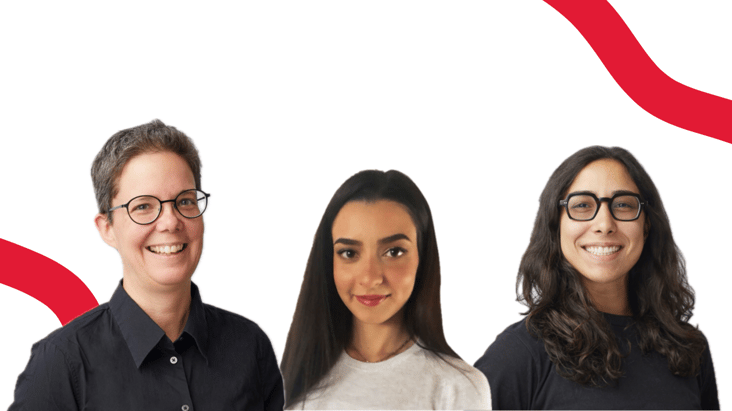-1.jpg?width=732&name=SARAH%20(1)-1.jpg)
According to a recent study by McKinsey, women occupy a mere 22% of all tech posts in Europe. We talked to Sarah Collard, Head of Projects New Markets at FAIRTIQ, about the possible reasons behind the industry's female talent gap, her own views on the subject, as well as her experiences as a woman in tech.
By 2027, the EU tech sector will have a talent gap of between 1.4 and 3.9 million people; the tech labour shortage in Germany alone will be around 780,000. The current talent pool, which is still very male-dominated, is not large enough to meet growing demand.
A study by McKinsey found that the EU could overcome this talent gap by doubling the share of women in the tech workforce to 45%, a move that would also boost EU’s GDP by 260 to 600 billion euros.
Entrenched stereotyping and misplaced perceptions about the skills and abilities of girls and women in STEM disciplines (science, technology, engineering, and mathematics) are two major contributing factors behind this talent gap. Already in school, girls do not receive adequate support in these subjects and are held to higher standards. An additional factor is the lack of female role models in the industry.
Over half of women in tech leave the industry mid-career
Companies should start considering the retention of women as a key performance indicator. They could also boost their development potential by recruiting women from non-traditional talent pools and helping them to hone their tech skills.
FAIRTIQ could also do better
Although most of the women employed by FAIRTIQ work in tech-related roles, only a few are engineers. FAIRTIQ wants to do something about this, which is why it makes sure that the wording of its job ads is as inclusive and sensitive as possible. As well as using gender-neutral language, FAIRTIQ makes every effort to invite as many women as men applicants for interview. The company also offers a host of family-friendly benefits, such as the possibility to work from anywhere, flexible working hours, fully paid maternity leave, to name but a few.
It should also be said that, although there is still room for improvement, women are better represented in the FAIRTIQ workforce than in the tech and mobility industry as a whole. Most teams have a large share of women; in the team led by Sarah Collard (Projects New Markets), the share is higher than 50%.
Interview with Sarah Collard, FAIRTIQ Head of Projects New Markets

We sat down with Sarah Collard, Head of Projects New Markets at FAIRTIQ, to talk about her own career trajectory and discuss the reasons for female underrepresentation in the tech and mobility industry.
With Sarah's background in economics and international management in very male dominated sectors such as the automotive and airline industries, her career has been shaped by her passion for people, company strategy and leadership. With plenty of work and life experience under her belt and a unique view on gender equality in work environments, Sarah shares her thoughts on the subject in the following interview.
FAIRTIQ: Sarah, tell us a bit about yourself, your professional background and how you ended up at FAIRTIQ.
Sarah Collard: After completing my Bachelors in Economics at the University of St. Gallen in Switzerland, I decided to do a Masters in International Management, but I also wanted a change of scenery. So, I studied abroad, in Dublin and Sydney. Between my two degrees, I worked for a year and a half in the automotive and airline industries, where I gained marketing experience.
Representing several minorities myself, I have always been sensitive to how companies deal with gender equality, diversity and inclusion, and how this impacts their employees’ work and success. My first internship was at the Mercedes-Benz Group AG, formerly known as Daimler-Benz AG. The automotive industry in Germany has a reputation for being very traditional and conservative, so I was mainly surrounded by male colleagues.
After this, I moved on to Swiss International Air Lines and worked in a similar department. For a year, I was part of an all-female team and was constantly impressed by the level of dedication and helpfulness of my co-workers, which ensured that we carried out every event successfully. However, in both those experiences, I realised that there were several differences between male and female working conditions, such as salary and performance recognition.
After my studies, it was clear to me that I wanted to work in a more sustainable industry and in a strategy-focused role. That is how I ended up in the Strategy and Innovation team at PostBus in Switzerland. Men and women were represented equally in this team and it was led by a woman. This diversity allowed for inspiring levels of creativity and innovation.
My time at PostBus was quite short though, because I heard about FAIRTIQ through my friend and colleague Julian, who convinced me to come on board. I started as a Project Lead and quickly took on a leadership role, first as Lead of the Fraud Operations team and now as Head of Projects New Markets.
FAIRTIQ: Did you ever imagine that you would work in the tech and mobility industry one day?
Sarah Collard: Not really. Throughout my studies, I was never passionate about any industry in particular but I was very much on a path towards working for large international companies. So it never crossed my mind to work for a smaller company, let alone a tech start-up. It is only after gaining initial work experience and hearing about FAIRTIQ that I had a better idea of what I wanted to do. Although I only have basic programming skills, I have always been interested in working with engineers because I find the nature of their job fascinating. On top of that, after working in the automotive and airline industries, and determined to do my bit to protect the environment, I wanted to find a job in an industry that would help me have a more sustainable impact.
FAIRTIQ: Do you feel that women are underrepresented in your industry?
Sarah Collard: Definitely. I think that there are fewer women than men in 95% of the meetings, conferences and trade fairs I attend. Actually, I always try to actively pay attention to this point and I often find myself the only woman or one of the few (but still very much underrepresented) women in the room. I think tech and mobility is probably a 'bad' mix for gender equality. Women in tech are clearly underrepresented, as tech roles are dominated by men.
FAIRTIQ: Why do you think that is?
Sarah Collard: I believe that for a long time, women were not encouraged enough to get a degree in tech or take on a tech-related role, probably because the belief was that men were better suited for these kinds of jobs. This led to the industry building up and being led predominantly by men, thus galvanised the idea that women should not pursue a career in tech. The lack of women across all industry structures but especially in leadership roles means that there are few female role models for young women to look up to when choosing a career path. On top of that, managers usually hire people who are similar to them. So, if most managers are men, the tendency is to keep hiring men rather than women. However, I am convinced that ideas and mindsets are changing, and that nowadays the industry is making a significant effort to push female representation to the front line in order to motivate more women to enter the industry. For instance, the public transport trade association UITP launched their Diverse Panel Charter this year to end all-male panels and boost female representation in the public transport sector.
FAIRTIQ: Why would you encourage women to opt for a career in the tech and mobility sector?
Sarah Collard: The tech and mobility sector is evolving fast, creating many opportunities for women to enter and grow in leadership positions. Right now, tech is disrupting mobility and especially public transport, as we know it. So, this is a fascinating time to be entering this industry. Because of this disruption, players in the industry are open (or even forced) to change, which allows tech companies like FAIRTIQ to embrace innovation, be creative and break existing rules and traditions. This applies not only to business models and products but also to the way that companies are structured and managed. So, there is a chance right now (and many more in the future) for women to start their career in the tech and mobility sector and have an impact that will bring about real change. The more women we have in the industry, the more diversity we will create and the faster we will become better innovators and be more successful.
FAIRTIQ: What goals have you set for yourself and your career for the future?
Sarah Collard: I want to keep learning in order to become a better leader, not only at FAIRTIQ but in the industry as a whole. I have already had amazing opportunities to represent FAIRTIQ as a speaker or moderator and hope I will get more chances to do this. At FAIRTIQ and as a leader, I hope to become an inspirational role model to show that people from minorities can take on leadership positions and help make a change in conservative and traditional industries. Only by allowing such role models can we pave the way for more equality and diversity .


-1.jpg?width=732&name=FTQ20_Banners5%20(1)-1.jpg)




Share